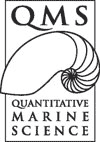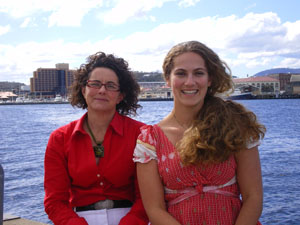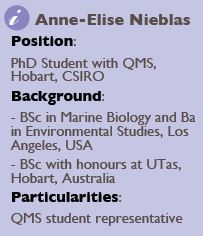

"I am passionate about the qualities of the QMS program," says Anne-Elise Nieblas, QMS PhD, Hobart.
Being a biological oceanographer, developing models and tagging sharks, coming from San Diego in California and enjoying the Tasmanian wilderness, maintaining a smile while finishing a PhD: all this is possible! Anne-Elise Nieblas is one of the 2 student representatives of the QMS CSIRO-Utas joint program in Hobart. She works on the impacts of climate change on the productivity of Australian fisheries.
Originally from California, she decided, during her undergraduate studies, to continue her research on an island half-way across the world: Tasmania. "During my exchange I found it much easier to network and make contacts in Hobart than I had in Los Angeles, and really enjoyed the lifestyle in Tassie. Hobart has a plethora of marine science organisations for a relatively small city, and a world-class scientific community." She came back for her honours and stayed for her PhD. Anne-Elise explains in this interview why she made the choice to stay.
 Marine ecosystems and fisheries are very important both culturally and economically, but their health and viability are under threat from climate change. However, at this stage, there is still little known about what the impacts of climate change might be. It is necessary to understand the effects on marine systems in order to inform adaptive management strategies. Climate change is a global issue and it's very rewarding being part of a solution.
Marine ecosystems and fisheries are very important both culturally and economically, but their health and viability are under threat from climate change. However, at this stage, there is still little known about what the impacts of climate change might be. It is necessary to understand the effects on marine systems in order to inform adaptive management strategies. Climate change is a global issue and it's very rewarding being part of a solution.
I have attended both domestic and international workshops. Conferences are some of the best parts of the PhD. It is fun and exciting to go to a new place and meet a new group of people that are interested in similar research fields. I have made some great contacts because conferences are an excellent chance to network and learn about new research.
I also attended a summer school-equivalent at IFREMER in Brest, France called Climate Driving of Marine Ecosystem Changes (ClimEco). This summer school provided hands-on training for young marine scientists to assist us in using climate model data for investigations into biological or biogeochemical studies. I found the training very helpful for my project, but I also enjoyed meeting the other participants. The facility at Brest was in a beautiful location, perched above the sea; the food was awesome; and the people were heaps of fun.
My project is computer-based; however to maintain my marine field skills I volunteer to help with other students' and CSIRO staff field projects, including scientific diving and shark tagging (once!). The dives have diverse aims but most often involve swimming along a transect and measuring something. Having said that, I really enjoy the fieldwork and have a lot of fun doing it! I have dived in some of the most beautiful sites around Tasmania and I have seen some amazing sea life.
Throughout the PhD, Bernadette has helped me with the oceanographic-aspects of my thesis. She takes her role very seriously and is constantly advising me not only on the science, but on a variety of other skills aimed at making me a successful scientist (e.g. ethics, networking, grant-writing). She is also great role model, especially in regards to women in science.
My three other supervisors (Prof Richard Coleman, Dr. Alan Butler and Dr. Anthony Richardson) have also been very helpful and have always found the time to include me in their busy schedules.
I definitely think that I benefitted by doing a PhD with the QMS program between UTAS and CSIRO. Through the university I was able to gain quality teaching experience by helping with undergraduate lectures, laboratories, and field courses. I really enjoy teaching, and I believe it has helped my scientific communication skills.
Being located at CSIRO has been a great benefit in terms of having access to good facilities and IT support, but also being surrounded by top-quality marine scientists. The research scientists at CSIRO are invaluable to a student because they are interested in your work, are keen to talk with you about it and offer valuable advice.
Anaïs van Ditzhuyzen